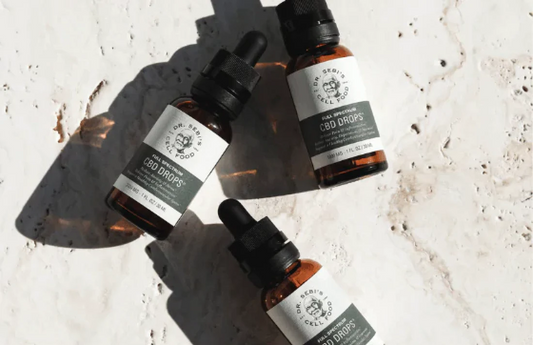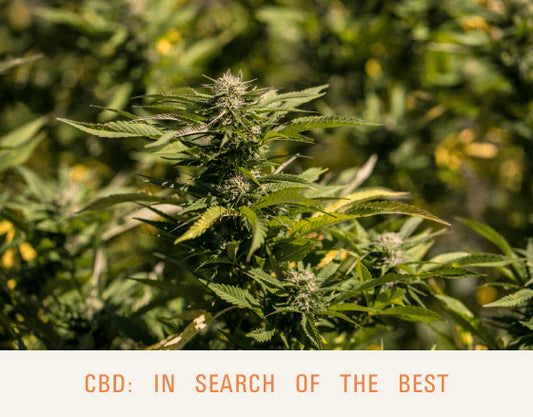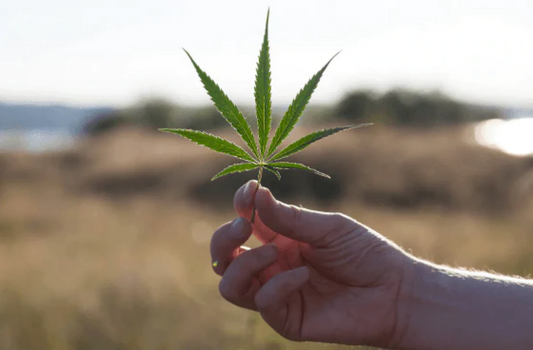From CBD oil, gummies, and vape pens to CBD-infused face lotion, lip balm, and dog treats, CBD is everywhere! It's easy to get swept up in the buzz surrounding CBD's purported benefits, but is it actually helping?
Whether you’re seeking anxiety relief or pain management, the potential applications of CBD seem endless—and, at times, far-fetched. As consumers, it's essential to separate fact from fiction and understand whether CBD lives up to the hype.
While research on CBD's efficacy is ongoing, there’s growing evidence to suggest that it may offer relief for certain conditions, such as chronic pain, anxiety, and epilepsy. However, it's important to realize that CBD isn’t a cure-all, and its effects can vary from person to person.
Understanding the limitations of CBD is just as important as recognizing its potential. Here's what CBD can do—and what it can’t.
Types of CBD
Not all CBD is created equal. CBD products can vary based on factors such as extraction method, cannabinoid content, and presence of other compounds. Here are the main types of CBD products you're likely to encounter:
- Full-Spectrum CBD: Full-spectrum CBD contains all the naturally occurring cannabinoids, terpenes, and other compounds found in the cannabis plant. This includes trace amounts of THC, the psychoactive compound in cannabis. Full-spectrum CBD is believed to offer enhanced therapeutic effects due to the interaction between cannabinoids and other plant compounds. This is known as the entourage effect.
- Broad-Spectrum CBD: Broad-spectrum CBD is similar to full-spectrum CBD but undergoes additional processing to remove THC. It's an option for people who want to avoid THC but may miss out on the entourage effect.
- CBD Isolate: CBD isolate is the purest form of CBD, containing only cannabidiol without any other cannabinoids, terpenes, or plant compounds. It’s typically available in crystalline form or as a powder and is often used to create CBD-infused products like edibles, topicals, and capsules.
Health Conditions and CBD
The application of CBD to various health conditions has gained significant attention in recent years, with researchers exploring its potential benefits for managing anxiety, chronic pain, epilepsy, and more.
Over time, these studies have been able to shed some light on how CBD works and its potential therapeutic benefits, paving the way for it to be used in mainstream Western medicine.
1. Anxiety
CBD's ability to help ease anxiety is thought to be related to its interaction with the endocannabinoid system (ECS), a complex network of receptors and neurotransmitters that regulates various physiological processes, including mood and stress response.
A March 2019 study in The Permanente Journal found that CBD significantly reduced anxiety scores in participants with sleep- and anxiety-related disorders. Specifically, CBD is believed to modulate the activity of mood-boosting serotonin receptors in the brain, according to an October 2015 study in Neurotherapeutics. Additionally, CBD may enhance the activity of gamma-aminobutyric acid (GABA), a neurotransmitter that has calming effects on the brain.
2. Chronic Pain
CBD's effectiveness in alleviating chronic pain is attributed to its interaction with the ECS, inhibiting the transmission of pain signals in the nervous system. Research suggests that CBD may modulate the activity of receptors for TRPV1 and opioids involved in pain perception.
Additionally, CBD has anti-inflammatory properties, which can help reduce pain caused by inflammation. A July 2016 study in the European Journal of Pain found that topical CBD application reduced pain and inflammation in animal models of arthritis. And a May 2012 study in the Journal of Experimental Medicine reported that CBD suppressed chronic inflammatory and neuropathic pain in rodents without increasing analgesic tolerance.
3. Depression
CBD's potential in managing depression is attributed to its interaction with the ECS and its ability to regulate neurotransmitter levels in the brain, particularly serotonin. Research suggests that CBD may inhibit the reuptake of serotonin in the brain, which is similar to how selective the antidepressants known as serotonin reuptake inhibitors (SSRIs) work.
While more research is needed, an October 2015 study in Neurotherapeutics suggested that CBD may have antidepressant-like effects in animal models of depression. Additionally, CBD's anti-inflammatory and neuroprotective properties may contribute to its antidepressant effects by reducing inflammation and oxidative stress in the brain.
4. Heart Health
CBD's potential benefits for heart health are credited to its anti-inflammatory, antioxidant, and vasodilatory properties. CBD may help reduce inflammation and oxidative stress in the cardiovascular system, which are key factors in preventing heart disease.
Additionally, CBD has been shown to lower blood pressure and improve blood flow by dilating blood vessels, potentially reducing the risk of heart disease and stroke. A June 2017 study in JCI Insight found that CBD reduced blood pressure in human subjects subjected to stress tests, suggesting its potential as a natural treatment for hypertension.
5. High Blood Pressure
CBD's ability to lower blood pressure—both resting blood pressure and blood pressure spikes due to stress—is attributed to its vasodilatory effects, which relax and widen blood vessels, allowing for better blood flow. Additionally, CBD's anti-inflammatory and antioxidant properties may help protect blood vessels from damage associated with high blood pressure.
6. Multiple Sclerosis
Because of its anti-inflammatory, neuroprotective, and immunomodulatory properties, CBD has the potential to help manage multiple sclerosis (MS) symptoms by reducing inflammation in the central nervous system.
Additionally, CBD may protect against nerve damage and promote myelin repair, the protective covering of nerve fibers that is damaged in MS. A March 2007 study in the European Journal of Neurology found that CBD improved mobility and reduced spasticity in MS patients.
And a March 2018 study in Frontiers in Neurology reported that CBD reduced pain and improved quality of life in MS patients.
7. Seizure Disorders
CBD's potential in helping to manage seizure disorders like epilepsy is well-documented, with numerous studies demonstrating its anticonvulsant effects. CBD interacts with receptors in the ECS and other neurotransmitter systems involved in seizure regulation, modulating neuronal excitability, and reducing seizure activity.
The most compelling evidence for this comes from clinical trials of Epidiolex, a CBD-based medication that is FDA approved for the treatment of certain types of epilepsy. These studies have shown that CBD significantly reduces seizure frequency and severity in patients with treatment-resistant epilepsy, including Dravet syndrome and Lennox-Gastaut syndrome.
8. Parkinson's Disease
The same neuroprotective, anti-inflammatory, and antioxidant properties that allow CBD to provide relief to MS patients are the same that also help people with the symptoms of Parkinson's disease (PD).
CBD may help reduce neuroinflammation and oxidative stress in the brain, while also enhancing dopamine levels and improving motor function by interacting with receptors in the ECS and other neurotransmitter systems involved in movement regulation.
While more research is needed, a September 2014 study in the Journal of Psychopharmacology found that CBD improved quality of life and reduced psychotic symptoms in PD patients.
9. Immune System Function
Studies suggest that CBD may help support immune system function by reducing inflammation and oxidative stress, which are key factors in the development of autoimmune diseases and chronic inflammatory conditions.
Additionally, CBD may modulate the activity of immune cells, such as T cells and macrophages, involved in immune system function. An October 2009 study in Future Medicinal Chemistry found that CBD had immunomodulatory effects in animal models of autoimmune diseases.
10. Post-Traumatic Stress Disorder (PTSD)
Due to its interaction with the ECS and modulation of neurotransmitters like serotonin and dopamine, CBD may help reduce anxiety, fear, and intrusive memories associated with traumatic experiences.
Additionally, CBD's anti-inflammatory and neuroprotective properties may help protect against the neurobiological changes associated with PTSD. While more research is needed, a July 2018 review in Frontiers in Pharmacology found that CBD reduced anxiety and improved sleep in PTSD patients.
Try Dr. Sebi’s Full-Spectrum CBD Oil
For those looking to ease stress, find relief from discomfort, or improve sleep, Dr. Sebi’s Full-Spectrum Hemp Drops present a powerful solution.
With a 2,000 mg concentration of full-spectrum CBD, this oil harnesses the complete array of hemp's beneficial compounds, delivering the entourage effect that amplifies CBD's calming, anti-inflammatory, and well-being enhancing properties.
By integrating these CBD oil drops into your routine, you're choosing a path of balance and natural health, supported by the holistic power of hemp.
Frequently Asked Questions
1. How long does CBD stay in your system?
How long CBD stays in your system depends on factors like dosage, frequency of use, and metabolism. Typically, CBD is detectable for a few hours to several days after consumption, reaching peak levels within 1 to 2 hours when taken orally.
For regular users or those taking higher doses, CBD may remain detectable for longer periods, potentially up to a week or more.
2. How does CBD make you feel?
The effects of CBD vary from person to person and can depend on factors such as dosage, body chemistry, and the form of CBD consumed. Many people report feelings of relaxation, calmness, and reduced stress after taking CBD, while others may experience increased alertness or improved focus.
3. Does CBD make you hungry?
While some individuals may experience increased hunger after taking CBD, others may not notice any significant changes in appetite. The relationship between CBD and appetite is complex and can vary depending on factors such as dosage, metabolism, and overall health. Further research is needed to fully understand how CBD influences appetite.
4. How much CBD should a beginner start with?
For beginners, it's recommended to start with a low dosage of CBD and gradually increase as needed. A common starting point is 5 to 10 milligrams of CBD per serving, taken once or twice daily. It's important to monitor how your body responds and adjust the dosage accordingly to achieve the desired effects while minimizing any potential side effects.

















































